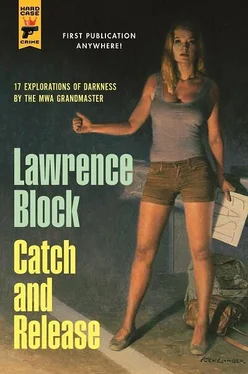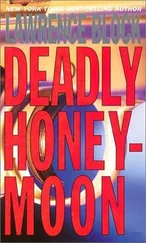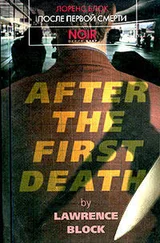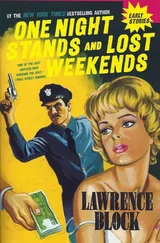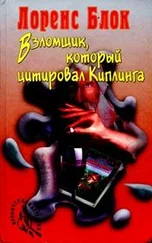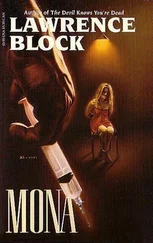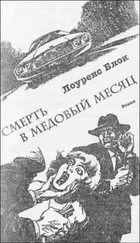“I know it was a rough day for you,” Bellerman said. “What can I say? Welcome to the real world, Kramer. You can get that putter repaired, you know.”
Kramer didn’t say anything.
“There are craftsmen who fit old clubs with new wooden shafts. It’s not cheap, but it’s worth it. Look, you played real golf today. This was the genuine article. Next time it’ll come a lot easier.”
Next time?
“And before you know it you’ll be hooked. You’ll see.” A hand on Kramer’s shoulder. “I’ll let you be, buddy. Lemme pop the trunk and you can get your clubs. Grab a shower, get yourself some rest. We’ll do this again.”
That was Saturday.
Sunday he stayed in and watched sports on TV. There was golf on one channel, tennis on another. Ordinarily he much preferred watching golf, but this day, understandably enough, it got on his nerves. He kept switching back and forth between the two channels, and was grateful when they were both done and he could watch Sixty Minutes instead.
Monday he went to the gym, warmed up on the elliptical trainer, then put in his time on the treadmill. There were runners, some of them men as old as he, some of them older, who entered the New York Road Runners races in Central Park, trying to beat others in their age group, trying to improve their times from one race to the next, trying to up their mileage and complete a marathon. That was fine for them, and he could applaud their efforts, but no one would fault a man who ran just for exercise, no one would argue that he wasn’t doing it right if he never took it outside of the gym.
Tuesday he went to the batting cage and took his cuts. He hit some balls well and missed some of them entirely, but he wasn’t so invested in results as to lose his temper with himself or his equipment. He never had the impulse to slam his bat against an unyielding metal post, or smash it over his knee. And he never for a moment saw his activity as a second-rate and laughable substitute for joining a team and playing baseball in the park.
Wednesday he went to the gun club, Thursday to the gym again, this time to lift weights. And Friday found him at the driving range at Chelsea Piers.
He hadn’t yet replaced his Big Bertha. It would be easy enough to do, one Big Bertha was essentially indistinguishable from the next, but he hadn’t yet had the heart for it. He hit his drives with his 2-wood, as he’d done on the course, hit a dozen balls with it, then continued to work his way through his bag of clubs and through two buckets of balls.
It wasn’t the same.
Memories of the previous Saturday kept getting in the way. “The wonderful thing about golf,” Bellerman had assured him, “is the way memory improves it. You remember the good shots and forget the bad. I suppose that’s one of the things that keeps us coming back.”
Wrong, dead wrong. He’d already forgotten the handful of good shots he’d managed to achieve, while the awful ones crowded his memory and got in the way of his practice today. He couldn’t take a club from his bag without recalling just how horribly he’d topped or sliced or shanked a shot with it. His mashie, which he’d hit solidly on Twelve, only to send the ball thirty yards past the damned green. His 3-iron, which he’d used from the rough, visualizing a perfect shot to the green between a pair of towering trees. And of course the ball had struck one tree dead center, rebounding so that it left him further from the hole than he’d started, but with the same shot through the trees. Second time around, he’d hit the other tree...
“Want to go out tomorrow?”
Bellerman, damn him. He drew a breath, forced himself to be civil. “No,” he said. “Thanks, but I can’t make it tomorrow.”
“You should, you know. Kid gets thrown from a horse, best thing he can do is get right back on him.”
And get thrown again?
“You obviously love the game, Kramer. Otherwise you wouldn’t be over here after a day like the one you had Saturday. But don’t try to make this take the place of the real thing. You’ve had a taste of golf and you want to keep at it, you know? Say, did you find somebody to put a new shaft on that putter?”
“Not yet.”
“Well, you will. Are you sure you can’t make it tomorrow? Well then, maybe next week.”
The weekend passed. Monday he ran on the treadmill, and afterward he went online and ordered a new Big Bertha driver. Tuesday he had a good session at the batting cage, and that afternoon he took his putter to an elderly German gentleman somewhere on the border of Brooklyn and Queens, who repaired old golf clubs and fishing rods in his basement workshop. The price was high, more than he’d originally paid for the club, but it was worth it and more if it could erase the evidence of his bad temper.
Wednesday he went to the gun club. He fired the deer rifle and the .22 at his usual targets, then took a break and sipped a cup of coffee. The weight machines tomorrow, he thought, and then the driving range on Friday, and Bellerman would show up, dammit, and what was he going to do about that, anyway?
The real world. There were, he supposed, fellow members of the gun club who hunted. Had country places in Jersey or Pennsylvania, say, and tried to get a buck in deer season, or a brace of pheasant at the appropriate time. But the majority of members, he was sure, just came to practice marksmanship. They didn’t think of their activity as a pale substitute for the real thing, and neither did anybody else.
He went back to practice with the magnum, selected his usual paper target. Then something made him switch to a target he’d seen used by other members — law enforcement personnel, for the most part. The target was a male silhouette, gun in hand.
It was strange at first. He’d always aimed at a bull’s-eye target, and now he was aiming at a human outline. It too had a series of concentric circles, centered upon the figure’s heart, so you could see just how close you came. And it wasn’t a person at all, it was just a piece of paper, but it still took a little getting used to.
And an odd thing happened. Welcome to the real world , said a voice in his head, and it was recognizable, that voice. It was Bellerman’s voice, and he steadied the big handgun and squeezed off a shot, and the gun bucked satisfyingly in his hand, and the bullet found its mark in the silhouette.
He kept hearing Bellerman’s voice in his head, and the two-dimensional generic silhouette began assuming three-dimensional form in his mind, and the face began wearing Bellerman’s features.
He spent a longer time than usual at the range, and his hand and forearm ached by the time he was done. The real world, he thought. The real world indeed.
He returned the rifle and the target pistol to his locker. No one noticed that he walked out with the magnum tucked into the waistband of his trousers, and the remainder of a box of shells in his pocket.
Would Bellerman show up again at the driving range Friday?
Perhaps not. Perhaps the man would have gotten the message by then and would leave him alone, having done what he could to ruin Kramer’s life.
But somehow Kramer doubted it. Bellerman was no quitter. He’d be there again, with the same abrasive drawl, the same smile that was never far from a sneer. The same invitation to a round of Saturday golf, which this time Kramer would accept.
Only this time there’d be something new in his bag. And, on one of the more remote holes at Bellerman’s club, Kramer would bring out not his brassie or his mashie or his niblick, not his sand wedge, not his (and God’s) 1-iron, but a .357 magnum revolver, cleaned and loaded and ready.
Welcome to the real world, Bellerman!
Читать дальше
